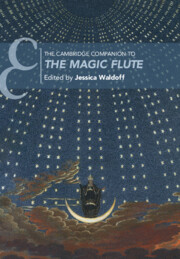Book contents
- The Cambridge Companion to The Magic Flute
- Cambridge Companions to Music
- The Cambridge Companion to The Magic Flute
- Copyright page
- Dedication
- Contents
- Figures
- Tables
- Musical Examples
- Contributors
- Acknowledgments
- Abbreviations
- Introduction
- Part I Conception and Context
- Part II Music, Text, and Action
- Part III Approaches and Perspectives
- 12 Seeking Enlightenment in Mozart’s Magic Flute
- 13 Birdsong and Hieroglyphs: Exoticism and Enlightened Orientalism in The Magic Flute
- 14 Partial Derivatives: Sources, Types, and Tropes in The Magic Flute
- 15 Pamina, the Queen, and the Representation of Women
- 16 Blackness and Whiteness in The Magic Flute: Reflections from Shakespeare Studies
- Part IV Reception, Interpretation, and Influence
- Further Reading
- Index
12 - Seeking Enlightenment in Mozart’s Magic Flute
from Part III - Approaches and Perspectives
Published online by Cambridge University Press: 24 November 2023
- The Cambridge Companion to The Magic Flute
- Cambridge Companions to Music
- The Cambridge Companion to The Magic Flute
- Copyright page
- Dedication
- Contents
- Figures
- Tables
- Musical Examples
- Contributors
- Acknowledgments
- Abbreviations
- Introduction
- Part I Conception and Context
- Part II Music, Text, and Action
- Part III Approaches and Perspectives
- 12 Seeking Enlightenment in Mozart’s Magic Flute
- 13 Birdsong and Hieroglyphs: Exoticism and Enlightened Orientalism in The Magic Flute
- 14 Partial Derivatives: Sources, Types, and Tropes in The Magic Flute
- 15 Pamina, the Queen, and the Representation of Women
- 16 Blackness and Whiteness in The Magic Flute: Reflections from Shakespeare Studies
- Part IV Reception, Interpretation, and Influence
- Further Reading
- Index
Summary
What is Enlightenment? In a certain sense, The Magic Flute may be understood as a playing out of Immanuel Kant’s answer to that question: “Sapere aude! [dare to know] – Have the courage to use your own understanding” – a challenge that is at the core of Tamino’s perilous journey. But the idea of Enlightenment and the complexity of original thought encompassed under its banner demands of us that we examine the deeper questions that it asks: What view of Enlightenment is conveyed in Mozart’s music and Schikaneder’s libretto, and how does this view accord with those strains of thought and expression, of wit and sensibility, that we take to constitute the defining aura of the Enlightenment? The great arias of Tamino and Pamina, studied as embodiments of these qualities, are viewed against the master plots of the opera.
Keywords
- Type
- Chapter
- Information
- The Cambridge Companion to The Magic Flute , pp. 187 - 199Publisher: Cambridge University PressPrint publication year: 2023

